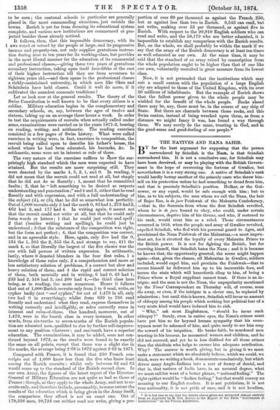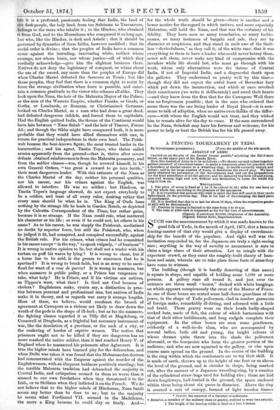THE NATIVES AND NANA SAHIB.
BY far the best argument for supposing that the person surrendered by Scindiah is the Nana, is that Scindiah surrendered him. It is not a conclusive one, for Scindiah may have been deceived, or may be playing with the British Govern- ment in the hope of recovering the fortress of Gwalior, but nevertheless it is a very strong one. A native of Scindiah's rank would hardly betray another of the princely caste who threw him- self on his protection unless he had something to dread from him, and that is precisely Scindiah's position. Holkar, or the Gui- cower, or any equal, would be safe enough with him ; but to him, as to his subjects, the man whom we call the Nana, the heir of Bajee Rao, is de jure Peishwah of the IVIahratta Confederacy, —that is, the Suzerain from whom the first Seindia. h revolted, whom he is de fare bound to obey, who could, under certain circumstances, deprive him of his throne, and who, if restored to his rank, would treat him as a rebel. Those circumstances occurred in 1858, when the people and army of Gwalior revolted, expelled Scindiah, who fled with his personal guard to Agra, and proclaimed the Nana Peishwah of the Mahrattas,,-a most. impru- dent act, for it rivetted the loyalty of every Mahratta Prince to the British power. It is not for fighting the British, but for coercing himself, that Scindiah hates the Nana ; and it is because he knows that, the opportunity granted, the scene might happen again—that, given the chance, all Mahrattas in Gwalior, soldiers included, would expel him, and proclaim the Peishwah—that to secure himself he delivered him up to his inexorable foes, and incurs the stain which will henceforth cling to him, of being a Prince whom a Royal suppliant cannot trust. If there is an in- trigue, and the man is not the Nana, the unpopularity mentioned by the Times' Correspondent on Thursday will, of course, soon die away, or even, if the intrigue is a clever one, be replaced by admiration ; but until this is known, Scindiah will incur an amount of obloquy among his people which nothing but political fear of a very acute kind would have induced him to risk.
"Why," ask most Englishmen, "should he incur such obloquy ?" Surely, even in native eyes, the Nana's crimes must have put him so far beyond human sympathy that his coun- rymen must be ashamed of him, and quite ready to see him reap the reward of his iniquities. He broke faith, he murdered men trusting in his honour, he massacred women and children, and he did not succeed, and yet he is less disliked for all those crimes than the chieftain who helps to ensure him adequate retribution. Why? The answer is worth giving, but in giving it we must make a statement which we absolutely believe, which we could, we think, were we writing a book, demonstrate conclusively, but which drives many Anglo-Indians into a sort of frenzy of denial, and that is, that natives of India have, in an unusual degree, what we must call for want of a better phrase, " national feeling." The right epithet would be "Indian feeling," but that would convey no meaning to our English readers. It is not patriotism, it is not true nationality, it is not pride of race, and it is not localism,
• It is but just to say that the details above given are extracted almost entirely from an Appendix by M. Elie Beclas to the Report of the Paris Institateurs at Institutriees " on the Vienna Exhibition. but it is a profound, passionate feeling that India, the land of the dark people, the holy land, from the Suleiman to Travancore, belongs to the races who inhabit it ; to the Hindoo, who obtained it from God, and to the Mussulman who conquered it so long ago, but who, like the Hindoo, is dark and Asiatic ; that it should be governed by dynasties of these faiths, however modified ; that its social order is divine ; that the peoples of India have a common cause -against the intruding, innovating white, neither whose courage, nor whose brain, nor whose justice—all of which they cordially acknowledge—give him the slightest business there. Natives do not deny the legitimacy of conquest, or whine about the use of the sword, any more than the peoples of Europe did when Charles Martel defeated the Saracens at Tours ; but like those peoples, they feel that there is a common right to resist by force the strange civilisation when force is possible, and enter- tain a common gratitude to the victor who releases all alike. They look upon the Nana, the heir of the Mahratta Mayor of the Palace, as the men of the Western Empire, whether Franks, -or Gauls, or Goths, or Lombards, or Romans, or Christianised Germans, looked on Charles Martel, as a man who had done a great deed, had defeated dangerous infidels, and forced them to capitulate. Had the English quitted India, the throne of the Continent would have lain between "Nana Saheb" and the heir of Timour, Feroze All; and though the Sikhs might have conquered both, it is more probable that they would have allied themselves with one, in return for practical independence in their own land. The Peish- wah became the best-known figure, the most trusted leader in the insurrection ; and his agent, Tantia Topee, who thrice called armies apparently from the ground—that is, thrice after severe defeats 3btained reinforcements from the Mahratta peasantry, and from the soldier classes—was, though he avowed himself, in his own General Orders, "too great a coward to go into battle," their most dangerous leader. With this estimate of the Nana as the Charles Martel of the day, neither his personal qualities, nor his career, nor his crimes against the English, was allowed to interfere. He was no soldier ; but Hindoos, as Tantia Topee's language showed, do not expect everybody to be a soldier, and least of all every ruler, desiring rather that every man should be what he is. The Ki g of Oude loses nothing by the strange life he leads in Garden Reach, as depicted by the Calcutta Correspondent of the Times, but rather gains, because it is so strange. If the Nana could rule, what mattered his character or his life ; or even if he could not, let others in his name? As to his career, he was simply the Peishwah, mediatised no doubt by superior force, but still the Peishwah, who, when he judged it fit, had conspired, and conspired successfully, against the British rule. For his crimes, what crimes had he committed in his career except "in the way," to speak vulgarly, "of business" ? It is wrong in native opinion to lie, but shall not a trader with his turban on puff his wares by lying ? It is wrong to cheat, but if a horse has to be sold, is the groom to announce that he is spavined? It is wrong to break faith, but is an army to be sacri- ficed for want of a ruse de guerre? It is wrong to massacre, but when massacre is public policy, or a Prince has vengeance to take, what help ? He is Prince, and if his victims are natives, as Tippoo's were, what then ? Is God not God because of cholera ? Englishmen make, cynics say, a distinction in prac- tice between personal and professional sins, but natives of India make it in theory, and as regards war carry it strange lengths. Most of them, we believe, would condemn the breach of agreement at Cawnpore as a vicious act likely to draw down the wrath of the gods in the shape of ill-luck; but as for the massacre, the fighting classes regarded it as Tilly did at Magdeburg, or Cromwell at Drogheda, as a frightful but necessary instrument of war, like the desolation of a province, or the sack of a city, or the enslaving of hordes of captive women. The notion that prisoners ought not to be killed if they are dangerous has no more reached the native soldier, than it had reached Henry V. of England when he massacred his prisoners alter Agincourt It is true the higher minds have learned pity for the defenceless, and when Delhi was taken it was found that the Mohammedan doctors had remonstrated with the Emperor against the murder of the Englishwomen, with an'eloquent boldness positively startling; but the terrible Mahratta tradition had debauched the majority in Central India, and extirpation seemed to them no worse than it seemed to our own forefathers when they threatened it to the Irish, or to Sicilians when they inflicted it on the French. We do not believe that to the higher minds of Hindostan, Nana Sahib seems any better than he does to us ; but to the majority he seems what Ferdinand VII, seemed to the Madrilefies, the more a King because he could slay so freely. And— for the whole truth should be given—there is another and lower motive for the regard in which natives, and more especially Ma.hrattas, still hold the Nana, and that was the certainty of his fidelity. They have seen so many treacheries, so many feeble- nesses, so many instances of bargain and sale, they are by character so suspicious, and they stand in such awe of the limit- less "devicefulness," as they call it, of the white race, that it was everything to them to have a leader who could never betray them, never sell them, never make any kind of compromise with the invaders while life should last, who must go through with his work, whose only alternatives were the throne of Central India, if not of Imperial India, and a disgraceful death upon the gallows. They understand us pretty well by this time— though they did not expect the awful burst of Berserkar fury which put down the insurrection, and which at once revolted their consciences (we write it deliberately) and awed their hearts —and they knew from the first that for the Cawnpore Well there was no forgiveness possible ; that in the man who ordered that scene there was the one living leader of Royal blood—it is non- sense to talk of adoption, when no native even thitks of the differ- ence—with whom the English would not treat, and they wished him to remain alive for the day to come. If the man surrendered be the Nana, Scindiah may have his fortress and welcome, for his power to help or hurt the British has for his life passed away.







































 Previous page
Previous page